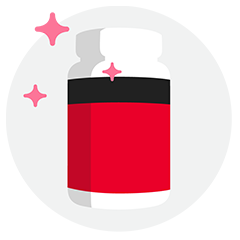Stopping the leak in leaky gut syndrome
Created on: February 13, 2021

The importance of gut health has hit a critical mass. Although leaky gut syndrome is not officially recognized as a medical condition, medical professionals now better understand the connection between the digestive system and its role in creating and preventing chronic disease. Learning to spot the symptoms of this condition is an important step in putting a stop to leaky gut syndrome.
What is leaky gut syndrome?
Leaky gut syndrome, otherwise known as high intestinal permeability, occurs when the lining of the intestines becomes damaged. This can cause undigested food particles, toxins and microbes to enter the bloodstream. These unwelcome guests lead to harmful chemical reactions and inflammation, thus compromising organ health and causing hormonal and chemical imbalance throughout the body.
Spotting the symptoms of leaky gut syndrome
Common symptoms associated with leaky gut syndrome include:
- Intestinal cramping, pain, bloating and gas
- Alternating diarrhea and constipation
- Poor concentration, brain fog, depression and anxiety
- Chronic fatigue and lethargy
- Itchy skin, rashes and acne
- Thinning hair, hair loss and scalp psoriasis
- Headaches and poor sleep
- Food and environmental chemical intolerances
What are the causes of leaky gut syndrome?
There are multiple lifestyle and nutritional factors that play a role in the progression of intestinal permeability. In order to stop leaky gut syndrome, it’s vital to limit these factors.
- High sugar intake: A diet high in sugar harms the barrier function of the intestinal wall, increasing intestinal permeability and eventually leading to a leaky gut.
- Excessive alcohol intake: Chronic alcohol consumption increases intestinal permeability.
- Non-steroidal anti-inflammatory drugs (NSAIDS): Repeated and long-term use of NSAIDS such as ibuprofen can contribute to leaky gut.
- Nutritional deficiencies: Deficiencies in vitamin A, vitamin D and zinc have each been shown to increase damage to the mucosal barrier.
- Stress: Chronic stress is a contributing factor to gastrointestinal disorders, including leaky gut.
- Inflammation: Chronic inflammation throughout the body has been closely correlated to leaky gut syndrome.
- Poor gut health or dysbiosis: The gut contains millions of bacteria, some of which are harmful, but these are balanced out by bacteria that are beneficial and necessary to our system. When this balance is disrupted, the barrier function of the intestinal wall can be negatively impacted.
- Yeast overgrowth: Although yeast is naturally present in the gut, an overgrowth of yeast can lead to Candidiasis, a known contributor to leaky gut syndrome.
Leaky gut and its connection to disease
Studies show that intestinal permeability is a critical factor in the development of various chronic diseases.
Celiac disease
Those with celiac disease are characterized as having a severe gluten sensitivity. Gluten, a protein found in wheat products, significantly increases intestinal permeability in those who suffer from celiac disease. In one study of celiac disease patients, 87% saw their intestinal permeability return to normal when gluten was removed from their diet.
Diabetes
Type 1 diabetes, a condition in which the immune system destroys the insulin-producing beta cells of the pancreas, may be triggered by foreign substances leaking through the gut due to increased intestinal permeability. Zonulin, a protein that regulates intestinal permeability, was shown to be significantly elevated in 42% of individuals with type 1 diabetes.
Crohn’s Disease
Various studies have shown increased intestinal permeability in people with Crohn’s while other studies found increased permeability in relatives of Crohn’s suggesting a potential genetic connection.
Irritable Bowel Syndrome (IBS)
Research shows that people with IBS are more likely to have increased intestinal permeability, particularly with diarrhea-predominant IBS.
Multiple Sclerosis (MS)
Scientists have found a connection between multiple sclerosis, a disabling condition of the brain and central nervous system, and increased intestinal permeability.
Rheumatoid Arthritis (RA)
Rheumatoid arthritis has been strongly connected to a leaky gut, leading researchers to examine the gut microbiome’s involvement in the early stages of RA.
Healing leaky gut naturally: Give your gut a little more love
Nutritional strategies
There are several approaches that can be taken when considering how nutrition affects gut health. Here are a few recommendations on where to start in your efforts to stop leaky gut syndrome:
- Avoid foods with gluten: Zonulin levels increase with gluten intake, which negatively affects intestinal permeability. A gluten-free diet at the outset of a gut-healing protocol will be most beneficial.
- Limit your intake of sugar: Excessive sugar intake harms the gut barrier and feeds harmful bacteria. Eliminating things like candy, soft drinks, and sugary cereals from your diet is a great place to start.
- Take a probiotic supplement: Probiotic supplements are beneficial for treating gastrointestinal diseases due to their ability to supply the gut with good bacteria, and maintain healthy balance between beneficial and harmful bacteria.
- Eat high-fibre foods: Soluble fibre, found in fruits, vegetables and legumes, feeds the beneficial bacteria found in the gut, while supporting a healthy microbiome.
- Repair your gut with colostrum: Colostrum, found in Innovite’s Gut Repair formula, is a milky fluid produced by mothers in the first few days after giving birth. It has been shown to heal leaky gut by restoring the intestinal lining to healthy permeability levels. It also contains high levels of immunoglobulins (antibodies) that support the gut’s microbiome.
- Collagen supplementation: Studies confirm collagen’s ability to fortify the intestinal lining, while healing the gastrointestinal tract. It also contains glutamine, which has powerful anti-inflammatory properties to support the gut.
Lifestyle factors
There are a few lifestyle factors that can contribute to leaky gut syndrome, and managing these are an important stepping stone on the road to recovery.
- Stress: Stress increases production of the stress hormone known as cortisol, which contributes to a leaky gut. Consider activities such as meditation, yoga and breathing practices to help lower stress levels.
- Poor sleep: Decreased or poor quality sleep can lead to higher intestinal permeability, likely due to its disruption of general immune function. Ideally, you should aim for 7-9 hours of restful sleep every night.
- Limit intake of NSAIDs: Studies show that NSAIDs cause damage to the intestinal lining. When possible, opt for alternatives such as physiotherapy and acupuncture to manage pain.






